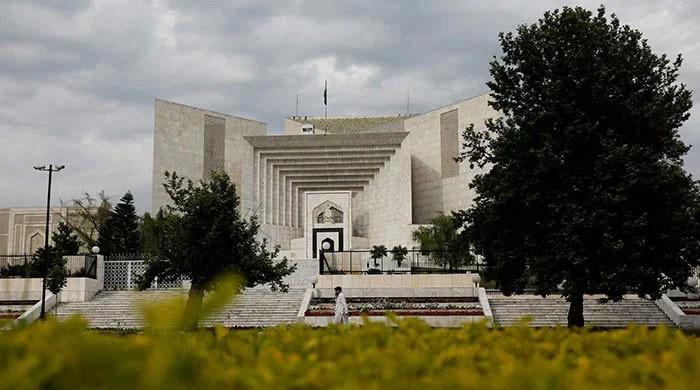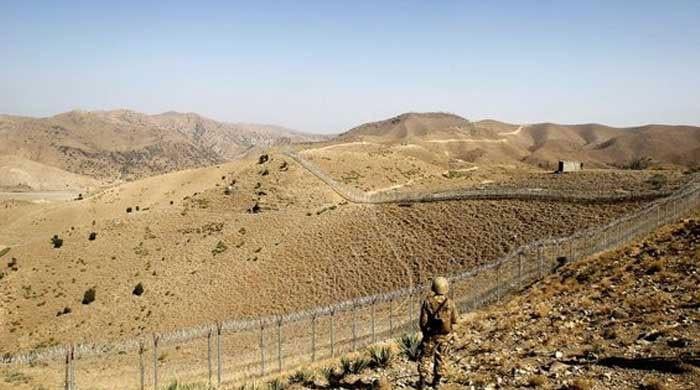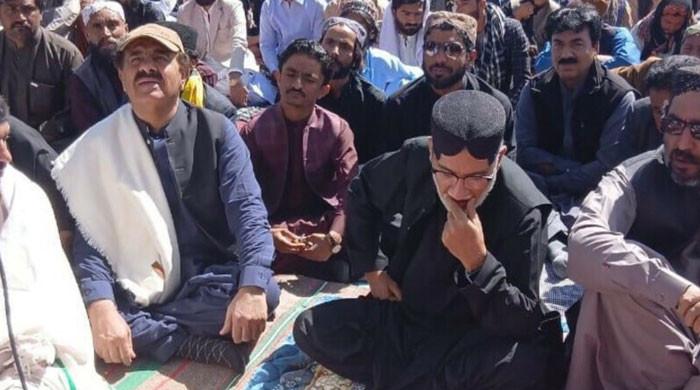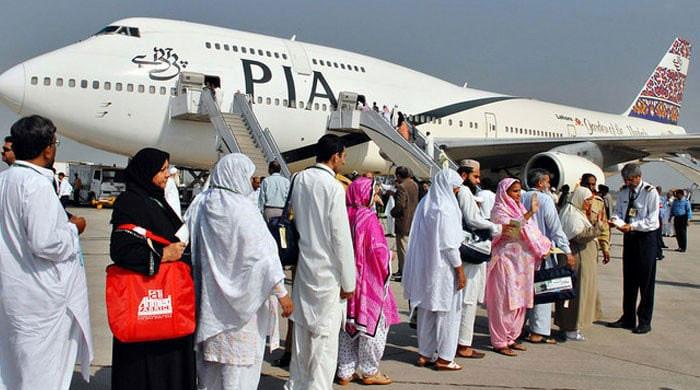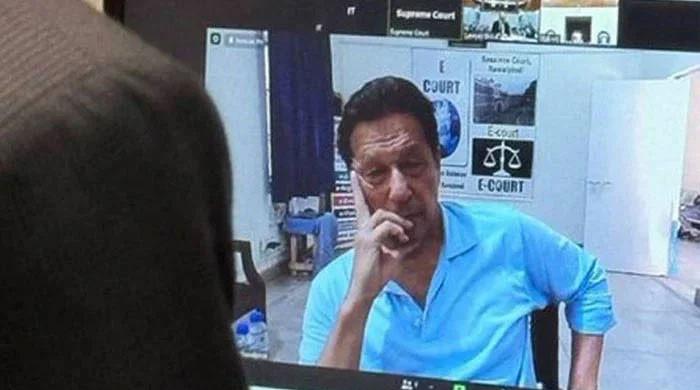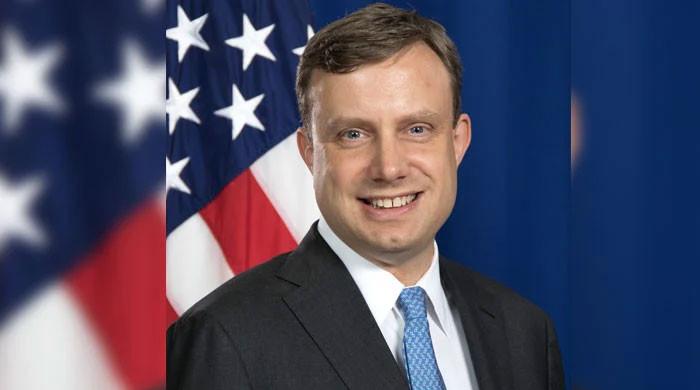Big powers shouldn't make 'terrorism a victim of geopolitics', Bilawal advises after US-India rhetoric
Khawaja Asif says terrorism entered Pakistan because it allied with US in war on terrorism
June 23, 2023
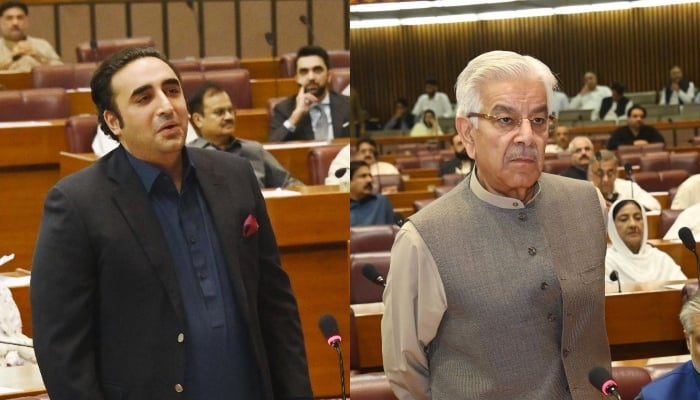
- "No reason for Pakistan to be insecure on US-India partnership."
- Bilawal also says Pakistan wants to fight terrorism for its people.
- Khawaja Asif says PM Modi continues to target minorities in India.
Following the United States and India’s joint statement mentioning Pakistan, Foreign Minister Bilawal Bhutto-Zardari said Islamabad shouldn’t be “insecure” about it but advised big powers not to make “terrorism a victim of geopolitics”.
In an address to the National Assembly, Bilawal said that the Foreign Office would issue a “detailed policy statement” on the recent US-India joint statement that mentioned Pakistan. However, he shared some “observatory notes” on the issue on the floor of the lower house of parliament.
The country's top diplomat told parliamentarians that he believes it is “important for Pakistan to stay away from world politics and focus on itself”.
He added once political stability and economic issues are resolved, then Pakistan can achieve its “international targets in the world”.
“I don’t believe there is any reason for Pakistan to be insecure about its relationship with the world or its bilateral partnership with America as a result of increasingly close cooperation between the US and India,” the foreign minister said. He added that Pakistan was standing on its own feet yesterday and is still standing today.
Pakistan, he further said, would move forward on its own as per the people’s aspirations, not because in the US-India joint statement, “terrorism was mentioned and Pakistan would take action”.
He also reminded the world that Pakistan is the most affected nation by terrorism, even if the casualties of India, the US, Iran and the rest of the world is counted.
“Due to our national security and the people’s future, we want to fight terrorism. We have before on the people’s mandate we took up this issue in 2008 and defeated them,” Bilawal said. However, he added that the policies of the Pakistan Tehreek-e-Insaf (PTI) government “pushed back” Islamabad.
“And once again this issue is a problem for us and today it is our problem and God forbid might become a problem for some other country. We want to fight [terrorism] for our reasons and to establish peace in our country,” he went on to say.
‘Easy to add focus on terrorism in statement’
In a rebuke to India on the inclusion of Pakistan’s name in the statement, the foreign minister expressed concern that ever since he took charge and departure of the world from Afghanistan, terrorism has been on the back burner, and Ukraine is the main issue.
“No one is focused on terrorism. It is very easy to add that “there should be work on terrorism” in your statement.”
He added that after the fall of Kabul, for the US, Europe or any other country, their focus is on “geopolitics and then other issues”.
“We believe that terrorism is such an issue that big powers should not make it controversial. They shouldn’t make it a victim of geopolitics. If we have to face terrorism properly then we will do it ourselves in our country,” he further said.
As far as fighting the menace of terrorism in the world is concerned, Bilawal said, Pakistan can only do it if its international partners take it seriously if they decide not to play geo politics on terrorism.
“The whole world will [have to] unite and fight this then we will be able to take out its root and end it.”
‘Terrorism entered Pakistan due to alliance with US’
The foreign minister touched on the topic of the US-India joint statement after Defence Minister Khawaja Asif spoke about it in the assembly before he was given the microphone.
Asif said that Pakistan today is paying a heavy price for serving as a frontline state in the two Afghan wars.
“Terrorism entered Pakistan because it acted as an ally of the United States in the war on terrorism,” he said, regretting that the sacrifices of Pakistan were not acknowledged.
The federal minister also recalled that it was Indian Prime Minister Narendra Modi who oversaw the killings of thousands of Muslims and the rape of Muslim women in Gujarat during his tenure as the chief minister of the state, and in recognition of those atrocities, the US, at that time, had imposed a ban on issuing a visa to him.
“The Indian prime minister continues to target the minorities, especially the Muslims. There is an undeclared curfew in Indian Illegally Occupied Jammu and Kashmir (IIOJK) and the people there are living under restrictions of all sorts in blatant violation of human rights,” Asif added. He also said that the Indian government is perpetrating state terrorism in the occupied territory.
Biden, Modi jointly call on Pakistan to end 'cross-border terrorism'
The minister spoke about the issue after US President Joe Biden and PM Modi jointly demanded Islamabad take steps to make sure that Pakistani soil is not being used in "launching terror attacks".
A joint statement issued after the meeting of Biden with the Indian premier, who is on a state visit to the United States, said that their countries stood together against global terrorism.
The two leaders called for action against extremist groups allegedly based in Pakistan, such as Lashkar-e-Taiba and Jaish-e-Mohammad.
“They strongly condemned cross-border terrorism, the use of terrorist proxies and called on Pakistan to take immediate action to ensure that no territory under its control is used for launching terrorist attacks,” the 58-point statement issued by the White House read.
Biden and Modi also reiterated the call for concerted action against all UN-listed terrorist groups, including Al-Qaeda, Daesh and Hizbul Mujahideen.
They stressed bringing the perpetrators of attacks, including the bloody 2008 siege of Mumbai and the Pathankot incidents.




